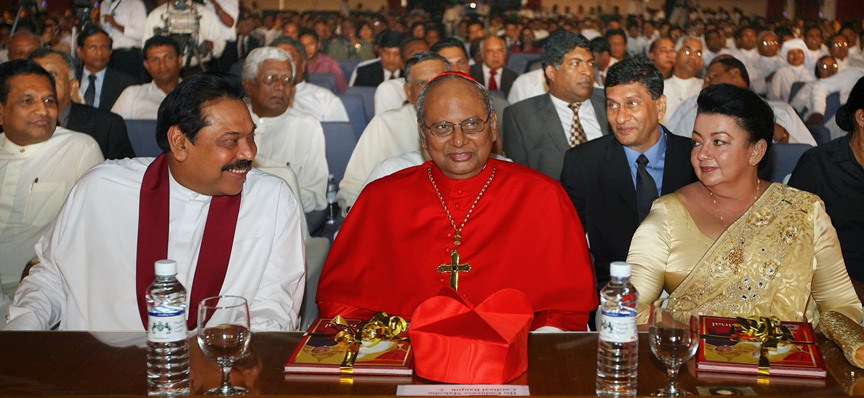
File photograph: Malcolm Ranjith and Mahinda Rajapaksa
Cardinal Malcolm Ranjith, Sri Lanka’s top Catholic official, has backed calls for a ban on all political parties “based on religion and language,” a move that has previously been proposed by Sri Lanka’s prime minister and one that may have dire consequences for the island’s Tamils and Muslims.
“I urge the government to ban all parties based on religion and language,” Ranjith said in a homily last week. “This is not a matter of politics, this is a matter of humanity,” he continued, adding, “It is wrong to base a political party on religion and language.”
“Today we debate issues such as what is the original language of this country, who are the original people, who owns the country. This partition began in the 1950s when we saw the error in deciding that only one language was the language of this country,” he claimed.
His comments echo proposals by Sri Lankan prime minister and accused war criminal Mahinda Rajapaksa, who has previously proposed a constitutional amendment which would severely weaken the voices of religious and ethnic-based parties. The proposed bill would raise the threshold of votes political parties would need to secure from 5 to 12 per cent. This would effectively silence Muslim political parties as well as significantly weaken other parties who will be unlikely to meet this threshold.
The archbishop, an ethnic Sinhalese who has a long history of supporting hardline Sinhala Buddhist figures and the Rajapaksa clan, and has repeatedly rejected an international probe into the massacre of tens of thousands of Tamil civilians by the Sri Lankan military.
He has previously stated that the Catholic Church in Sri Lanka has rejected resolutions on accountability for atrocities in Sri Lanka at the UN Human Rights Council, calling "such efforts by western powers is an insult on the intelligence of the people of Sri Lanka”. Ranjith has also denied allegations of war crimes committed by the Sri Lankan military that Tamil bishops made to US officials in previous years.
We need your support
Sri Lanka is one of the most dangerous places in the world to be a journalist. Tamil journalists are particularly at threat, with at least 41 media workers known to have been killed by the Sri Lankan state or its paramilitaries during and after the armed conflict.
Despite the risks, our team on the ground remain committed to providing detailed and accurate reporting of developments in the Tamil homeland, across the island and around the world, as well as providing expert analysis and insight from the Tamil point of view
We need your support in keeping our journalism going. Support our work today.
For more ways to donate visit https://donate.tamilguardian.com.

